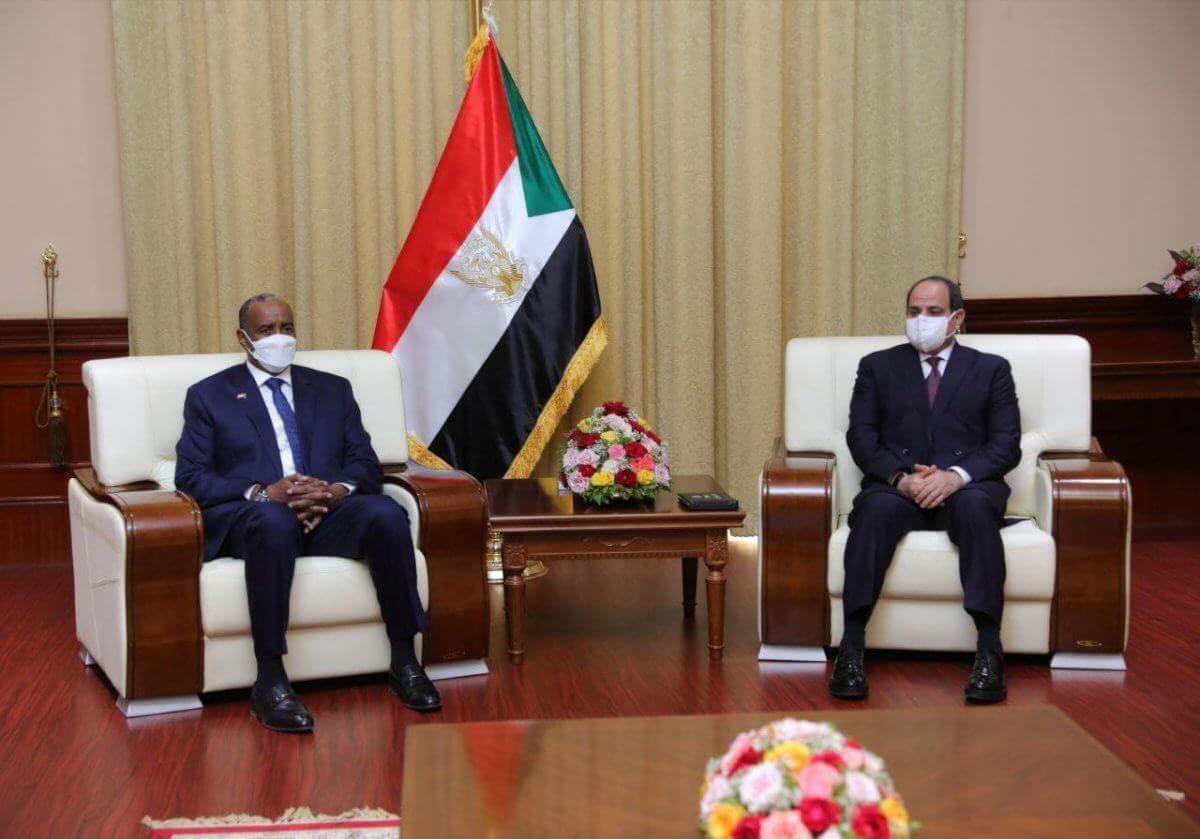Sudan and Egypt confirmed, on Saturday, their rejection of any unilateral measures regarding the Renaissance Dam, agreeing that the dam issue “is going through a delicate stage that requires the highest levels of coordination.”
This came during talks between Abdel Fattah al-Sisi and the head of the Sudanese Sovereignty Council, Abdel Fattah al-Burhan, in the capital, Khartoum, according to a statement by the presidency.
Ethiopia insists on the start of the second filling of the Renaissance Dam next July, while Khartoum and Cairo adhere to first reaching a tripartite agreement, in order to preserve their annual share of the Nile water, amid stalled negotiations led by the African Union for months.
Al-Sisi stressed that “the security and stability of Sudan is an integral part of the security and stability of Egypt.”
For his part, Al-Burhan pointed out during the meeting that “the Egyptian-Sudanese relations are distinguished by distinction, specificity, and unity of destiny.”
The statement pointed out that “the meeting witnessed an exchange of views on the developments of the Renaissance Dam conflict, and it was agreed to reject any unilateral measures aimed at imposing the status quo and strengthening bilateral, regional and international efforts to reach a comprehensive agreement that is legally binding.”
According to the statement, “It was also agreed that the current delicate stage that the Renaissance Dam file is going through requires the highest degree of coordination between Egypt and Sudan, as the two downstream countries that will be directly affected by this dam.”
The two sides also affirmed “their support for the Sudanese proposal to form an international quartet that includes the presidency of the African Union, the United States, the European Union and the United Nations to mediate in this file.”
On February 24, Egypt announced its support for Sudan’s proposal, which was issued a few days ago at the time, to form a quadripartite international mediation to resolve the stalled “Renaissance Dam” negotiations over a period of 10 years.
In a related context, the talks between Al-Sisi and Al-Burhan touched on “recent Sudanese moves to extend state sovereignty over its eastern borders bordering Ethiopia within the framework of its respect for international agreements and its constant endeavor to assert the state’s sovereignty peacefully and without resorting to violence.”
For months, the Sudanese-Ethiopian borders have been experiencing tensions, after Khartoum announced at the end of 2020 control of “its lands” in the border area with Addis Ababa, amid Ethiopian assertion that it had “seized 9 camps belonging to it.”
In a subsequent press conference, with Al-Burhan, Al-Sisi said, “Ethiopia’s adherence to the second filling of the Renaissance Dam, even if no agreement is reached, which may threaten serious damage to Egypt and Sudan.”
He added, “We emphasized the importance of returning to serious and effective negotiations to reach at the earliest opportunity a fair, balanced and legally binding agreement regarding the filling and operation of the Renaissance Dam.”
He continued, “We want to return to negotiations through a quadripartite mechanism that includes the African Union, the United States, the European Union, and the United Nations to mediate the negotiations.”
For his part, Al-Burhan said at the same conference: “We discussed all files of joint cooperation, and reached unified visions that serve progress, development, and stability,” stressing that Sisi’s visit “is a real support and support for Sudan.”
On Saturday, Sisi arrived in Khartoum on a one-day visit, the first of its kind since the ouster of former President Omar al-Bashir, in April 2019.














